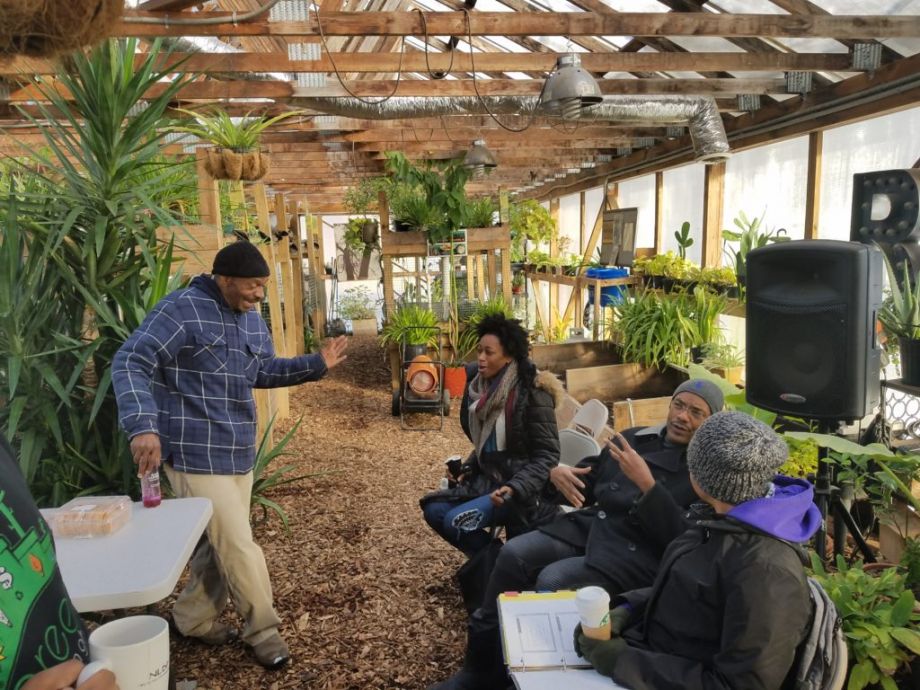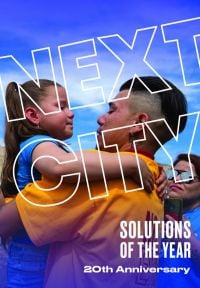This is your first of three free stories this month. Become a free or sustaining member to read unlimited articles, webinars and ebooks.
Become A MemberAt Next City, we publish hundreds of stories each year. Early in 2023, we published pieces about making transit shutdowns as painless as possible for riders, an alternative to police in Minneapolis and a restorative justice program at San Quentin Prison. More recently, we’ve covered a coworking space created by and for Black mom entrepreneurs, the final weeks before the Dorchester Food Co-op’s opening and D.C.’s ‘Tenant Opportunity To Purchase’ Law.
Throughout the year, we publish stories that are still relevant for years to come because they show that change is possible — and provide examples of what can be implemented in your city or another city on the other side of the globe. Below, we’ve collected our staff’s favorite stories from 2023. Each tells the story of solutions to our most pressing social issues.
For even more proof that change is already happening in cities across the globe, check out our annual Solutions of the Year Magazine, which this year celebrates our 20th anniversary.
In this piece on San Francisco’s Vacant to Vibrant program, our senior economic justice correspondent Oscar Perry Abello digs into the past, present and future of the Filipino community in the Bay Area, looking at how real estate development and the tech industry played a role in displacing these ethnic enclaves. Now, Desi Danganan – Next City Vanguard alum and founder of the nonprofit Kultivate Labs – is using a “pop-up to permanent” model to bring Filipino businesses and artists to vacant storefronts along SOMA’s Mission Street corridor.

(Credit: Kultivate Labs)
I love the historical gems Oscar brings to this story, showing how this often-ignored history and cultural heritage can help herald a new era for San Francisco’s downtown and this iconic commercial corridor. – Aysha Khan, managing editor
In a remarkable story of organizing and innovation from East Boston, we discover a tenant who valiantly fought her eviction for eight years. First, this story is a testament to the power of combining a tenant’s will to fight with the indispensable role of organizing groups. We’re reminded not only of the potential of grassroots movements but also of the need for more proactive city policies. This narrative, more than just a tale of personal tenacity, has profound lessons for cities nationwide. My biggest takeaway is that an investor recognized the inherent value in a low-income neighborhood long before the city did. This investor acted by gobbling up properties while hoping to turn a major profit, contrasting sharply with the city’s delayed response, which eventually led to purchasing the same buildings at a substantially higher cost and placing them in a trust. This story serves as a crucial lesson: cities must act swiftly to preserve affordable neighborhoods, rather than waiting and facing inflated costs later or suffering the permanent effects of gentrification and displacement. —Lucas Grindley, executive director
As a Black man from the South who grew up in the Southern Baptist church, I have grown away from the church in many ways because I am a believer in the teachings of Christ and to fail to take care of one’s neighbor or neighborhood is a failure to truly be like Jesus. (For context, Southern Black Baptists and Southern white evangelical Baptists are philosophically different but still, for the most part, have been conservative in many ways.) Many churches take more than they give to the community or the environment. This piece helped to restore a bit of hope because this church and the program that it operates alongside are showing up for the community they are a part of. And they’re not only showing up with a food drive or a backpack giveaway, which serves an immediate need. Rather, it is helping the members of the community in the long term by investing in the local environment. I love seeing two things I care about (spirituality and the earth) come together. – Deryle Daniels, major gifts officer
The group of people in this story turned acres of land in a disinvested neighborhood into a thriving food ecosystem that improves access to food and creates local jobs. Rid-All Green Partnership’s cofounders are childhood friends who grew up on Cleveland’s east side. They started their work in 2011 on 1.3 acres of vacant acres in the Kinsman neighborhood, with a single hoop house. Now, they steward 18 acres of land with “two greenhouses, six hoop houses, a commercial composting station, and a rain catchment pond.”
“We’ve created a circular economy,” Keymah Durden, a Rid-All co-founder, told Next City. “Piece by piece, we’ve built this business with things that complement each other.”

(Credit: Rid-All Green Partnership)
They’ve proven what is possible when you have a team of people committed to a vision for a thriving neighborhood and they put in the work to bring it to fruition. This story also reminds me of another favorite about the first community-owned microgrid in Puerto Rico. (It’s hard to choose just one.) I love learning about people taking power into their own hands and making things better for others in their communities. — Deonna Anderson, editoral director
I picked this article as my top choice for 2023 because it truly embodies what I admire most about Next City — delivering complex concepts through practical, on-the-ground examples. This story intertwines finance, community investment, and cultural expression by highlighting a cocktail bar that’s leading the charge toward a more equitable future in a highly competitive industry.
As someone who grew up with a membership at a local food co-op, I’ve always felt a sense of belonging in initiatives that aim to make healthy food more affordable for everyone. Similarly, my experience in the restaurant industry has taught me the importance of teamwork and excellent service. However, I’ve also become increasingly frustrated with the industry’s outdated elements. That’s why this story struck a chord with me. It’s a powerful reminder that industries are evolving and developing new, equitable models that benefit local economies. It’s refreshing to have hope for the future, especially in a city like NYC that faces numerous challenges. — Sara Schuenemann, events director
Solutions are born from necessity, and no other time in recent history may have highlighted that more than the global pandemic that was COVID-19. During the 2022 Vanguard conference that took place in El Paso and Juárez, we learned about the porosity of the border and the vibrant community that lives and thrives on both sides.

(Photo by Omar Orenelas/El Paso Matters)
In one of Next City’s earliest stories from 2023, our Equitable Cities Reporting Fellow, Christian Betancourt, reported on the resourcefulness and porosity of the borderlands when it came to superseding red tape and inoculating Juárez residents with vaccines that would have otherwise expired if not used while in the United States. The innovative strategies that can be read about in this story, without question, saved countless lives. — Melissa Simpson, audience engagement editor
As we begin to explore and consider other factors that help bring our solutions to fruition, seeing how others are uniquely overcoming financial obstacles is exciting. There are so many new ways to give traditional funding methods new life and this piece gave a thorough, in-depth look at just one of them. Perspective is everything and sometimes reading about how someone else is tackling a hurdle to a much larger problem is just as powerful as resolving the core issue, in this case food systems, as it can be applied to other systemic issues anywhere. — Barry Greene Jr., equitable cities reporting fellow for reparations narratives
The emergence of “Pop-Up Care Villages” (PUCVs) revolutionizes homeless aid, merging essential services with joyful community gatherings. LavaMaeX pioneered these events in 2016, bridging service gaps with socializing, wellness care, and meals alongside critical assistance. PUCVs offer a holistic solution, uniting service providers, volunteers, and homeless individuals, fostering connections, and restoring dignity. LavaMaeX’s toolkit has empowered over 11 organizations in the U.S., Canada, and the Philippines to replicate these events. PUCVs address homelessness creatively, catalyzing hope, community support, and fundraising efforts nationwide. Solutions for the unhoused is a subject close to my heart, and this article brought me hope that these events can help undo many false narratives our society holds about why someone is living on the streets. — Pardise Amirshahi, integrated sales & marketing partnerships director

Deonna Anderson is Next City's editorial director. An award-winning journalist, she has served as a senior editor at GreenBiz and worked with YES! Magazine, KLCC (an NPR affiliate station in Eugene, Oregon), The Lily, Atmos and other media outlets. Anderson is an alumna of the University of California, Davis and the Craig Newmark Graduate School of Journalism at CUNY. She lives in the Bay Area. She was also Next City's 2017-2018 Equitable Cities Reporting Fellow. Follow her on Twitter @iamDEONNA.
Follow Deonna .(JavaScript must be enabled to view this email address)

20th Anniversary Solutions of the Year magazine
Add to the Discussion
Next City sustaining members can comment on our stories. Keep the discussion going! Join our community of engaged members by donating today.
Already a sustaining member? Login here.